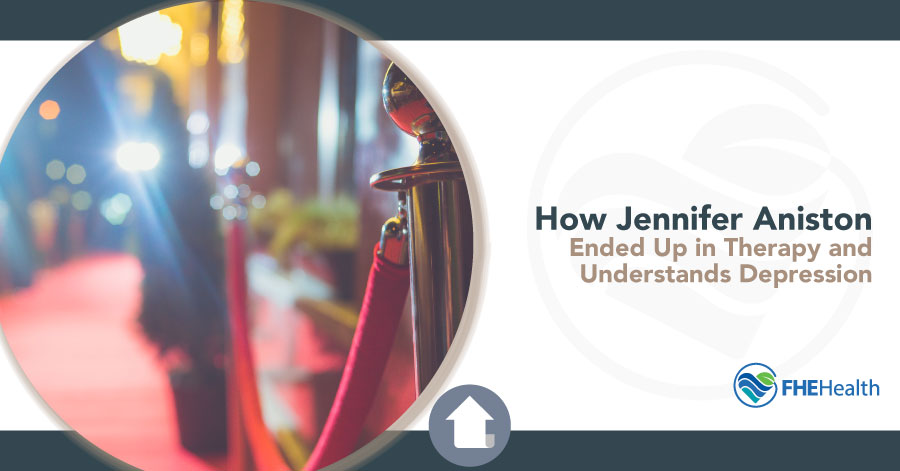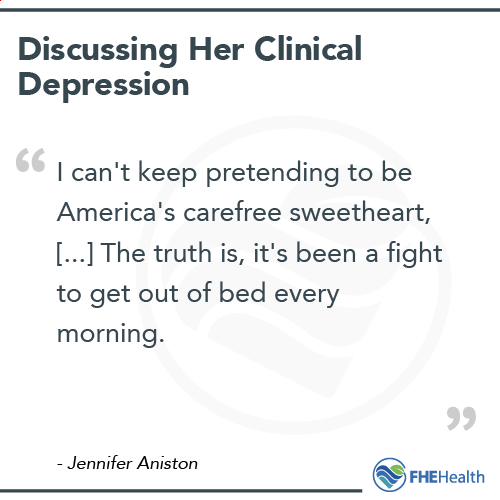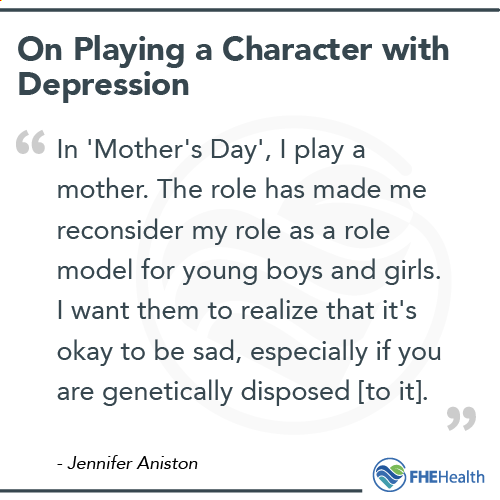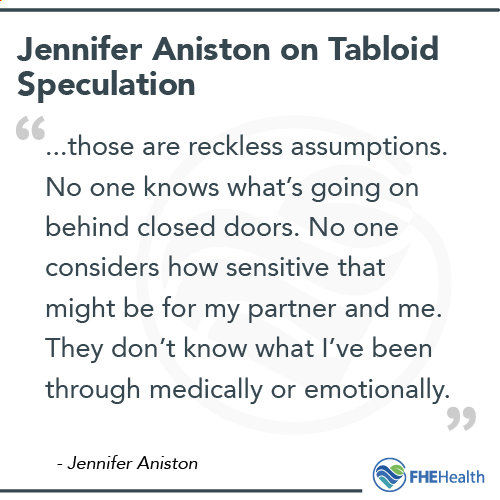
Spend any time standing in the checkout line at the grocery store and you can’t miss the headlines about Jennifer Aniston on magazine covers. She’s marrying again, she’s pregnant, she’s not pregnant, she’s still sad about Brad, she’s adopting, she’s single— when it comes to the roller coaster of celebrity life, Aniston is like her own carnival attraction. The former star of Friends is a household name. She can’t even change her hairstyle without making headlines.
Like many celebrities, Aniston is forced to take note of those headlines and paparazzi photos, too, and left to cope with the discomfort of reading items that simply aren’t true. Aniston has opened up about her struggles with heartbreak and depression as well as her “choice” to be happy and embrace therapy. For Aniston, it’s not only the pitfalls of fame that affect her. Like everyone, she has a private life and personal issues that affect her mental health as well.
In interviews, Aniston has acknowledged her feelings about mental health and the importance of protecting it. She has been open about being in therapy for years and has even acknowledged that one of the heartbreaks she suffered was when her therapist passed away unexpectedly. Yet, with each struggle, Aniston is determined to take care of her mental health and seeks treatment when she needs it.
Jennifer Aniston’s Career
 Aniston was born in the Los Angeles neighborhood of Sherman Oaks. She is the daughter of actors John Aniston and Nancy Dow. The family moved to New York City where much of John’s work was based, but her parents divorced when she was nine years old. Aniston has stated that she came home from a birthday party and her dad had moved out. She has often commented on the shock that she experienced that day. Aniston has also revealed that her relationship with her mother has been troubled over the years. She never felt that she was as “pretty” as her mother wanted her to be.
Aniston was born in the Los Angeles neighborhood of Sherman Oaks. She is the daughter of actors John Aniston and Nancy Dow. The family moved to New York City where much of John’s work was based, but her parents divorced when she was nine years old. Aniston has stated that she came home from a birthday party and her dad had moved out. She has often commented on the shock that she experienced that day. Aniston has also revealed that her relationship with her mother has been troubled over the years. She never felt that she was as “pretty” as her mother wanted her to be.
Participating in the drama club and drama studies helped Aniston develop her own goals in the acting field. Unfortunately, her first forays into film and television were unsuccessful. When asked in an interview if she ever “woke up not knowing who she is,” Aniston teared up. This early period of her career was fraught with insecurity, and those insecurities would manifest at other periods of her life in different ways. Aniston has stated that fame isn’t a cure for insecurity.
Of course, the young actress did get her break when she was cast in the show “Friends,” of the smash hits of the 1990s. The show catapulted its cast to stardom and launched Aniston on a path to lasting Hollywood success. She is, after all, one of the highest-paid actresses in Hollywood and today has a net worth of more than $200 million.
Aniston currently acts, produces films, and appears in commercials for high-end companies. She continues to grace the covers of magazines, many of which still speculate about her relationship with her former husband Brad Pitt (they divorced in 2005). Yet, even with her triumphant career, Aniston has felt compelled to seek therapy– and has been in therapy for years to find support for her depression, inability to express anger, and traumatic experiences related to her childhood, undiagnosed dyslexia, and the ups and downs of adult life.
Jennifer Aniston on Depression
 Aniston has revealed that her struggles with depression likely began in childhood. In fact, she’s said that her strong friendships have “raised” her, particularly the friendships she developed with Courtney Cox of “Friends.” She revealed that she and her co-stars mothered and nurtured one another in order to “fill the void” left by their parents.
Aniston has revealed that her struggles with depression likely began in childhood. In fact, she’s said that her strong friendships have “raised” her, particularly the friendships she developed with Courtney Cox of “Friends.” She revealed that she and her co-stars mothered and nurtured one another in order to “fill the void” left by their parents.
Aniston also revealed that she found it difficult to express anger, but that the emotion would seep out in passive-aggressive ways, ways that she now knows are unhealthy. She decided to enter therapy many years ago and got help coping with the issues she traced back to her childhood. She came to terms with her mother’s behaviors toward her and learned to recognize her mother’s own emotions drove many of her parenting choices. Aniston says her mother was extremely concerned about physical beauty. Aniston felt that she wasn’t the “model” child her mother was hoping for.
She also came to understand that her mother tried her best, but that it was difficult to be a single mom during the 1980s. While the two were estranged for many years, they patched up their relationship before her mother passed away. The focus on physical beauty is something Aniston has also addressed in therapy and is concerned about in others. She’s talked about the downside of social media sites like Instagram and how they perpetuate a focus on physical appearance.
Today, Aniston says she feels happy, but when she is not, she needs a “perspective shift.” When a person suffers from depression, they often find it difficult to escape its mindset. She finds that working with a therapist and maintaining positive relationships with friends provide her with those alternative perspectives that allow her to see and move past depressive episodes. Aniston also practices yoga and mindfulness as a way to maintain her mental health.
The Importance of Celebrities Getting Real about Mental Health
Celebrities don’t have a mandate to open up about their personal struggles with mental health and, yet, those who do are doing their fans and our society a great good. Everyone experiences disturbances in mental health. For one in five, a clinical diagnosis of depression or a condition like anxiety can result. When stars like Aniston discuss their own struggles with mental health, it reduces the stigma and makes it easier for others to open up and seek help.
Fans have heard Aniston say multiple times in various interviews that she “chooses” to be positive or chooses to be happy, but there’s a deeper revelation here. She also chooses to work with a therapist for the support needed to become empowered, to be able to make those choices that nurture positivity and happiness. Aniston has been very clear that she hasn’t gotten over her bouts with depression alone. She’s had extensive therapy and is active in her approach to maintaining a healthy mindset.
Celebrity Life and Mental Health
 Many celebrities have opened up about the negative experiences they’ve had in relation to their fame. Aniston has revealed great vulnerability by expressing the hurt she’s felt when she reads about pregnancy speculations, for instance. She finds it frustrating to see her romantic relationships rehashed over and over again for years in gossip magazines. It’s obvious that the headlines can be hurtful and have hurt the actress over the years.
Many celebrities have opened up about the negative experiences they’ve had in relation to their fame. Aniston has revealed great vulnerability by expressing the hurt she’s felt when she reads about pregnancy speculations, for instance. She finds it frustrating to see her romantic relationships rehashed over and over again for years in gossip magazines. It’s obvious that the headlines can be hurtful and have hurt the actress over the years.
However, Aniston is quick to remind everyone that she experiences pain and other negative emotions much like everyone else. Fame hasn’t insulated her from the human experience. The actress has stated, “I don’t love being famous because I don’t love the negativity and judgment that comes along with it.” Yet, she has learned to take many of those misleading headlines about her life in stride.
In fact, her desire to open up about mental health has even led her career in new directions. She decided to take on a film with a mental health focus, playing a woman battling depression after the loss of a son. Aniston has long taken comedic parts, but in recent years, she’s taken on more dramatic roles associated with issues that are important to her or that she believes are important to address.
Part of Aniston’s lasting charm for her fans is her ability to relate. Her depression isn’t due only to struggles with fame but to many of the fears and emotions that others face– difficult relationships with parents, a health diagnosis (in her case–dyslexia), insecurities, break-ups, disappointments. Aniston has demonstrated that mental health should never be a backseat issue. It’s something that people must address head-on and with therapy. No matter what she’s going through, she’s been committed to “taking care of herself,” and that means getting therapy when she needs it.






